|
|
|
Sort Order |
|
|
|
Items / Page
|
|
|
|
|
|
|
| Srl | Item |
| 1 |
ID:
151518
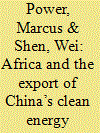

|
|
|
|
|
| Summary/Abstract |
The spectacular scale and speed of China’s domestic renewable energy capacity development and technology catch-up has in recent years been followed by the ‘go out’ of Chinese clean energy technology firms seeking new markets and opportunities in sub-Saharan Africa. This paper explores the growing involvement of China in the development and transfer of renewable energy technologies in Africa and examines the key drivers and obstacles shaping Chinese renewable energy investments and exports. Far from there being some kind of grand or harmonious strategy directed by a single monolithic state, we argue that fragmented and decentralised state apparatuses and quasi-market actors in China are increasingly pursuing their own independent interests and agendas around renewable energy in Africa in ways often marked by conflict, inconsistency and incoherence. Moving beyond the state-centric analysis common in much of the research on contemporary China–Africa relations, we examine the motivations of a range of non-state and quasi-state actors, as well their different perceptions and constructions of risk, policy environments and political stability in recipient countries. The paper explores the case study example of South Africa, where Chinese firms have become increasingly significant in the diffusion of renewable energy technology.
|
|
|
|
|
|
|
|
|
|
|
|
|
|
|
|
| 2 |
ID:
151522
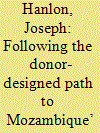

|
|
|
|
|
| Summary/Abstract |
Strenuous efforts by donors and lenders over four decades turned Mozambique from a socialist success story into a neoliberal capitalist one. The private sector dominates; a domestic elite dependent on foreign companies has been created. But a secret US$2.2 billion arms and fishing boat deal involving Swiss and Russian banks and Mozambican purchases from France, Germany, and Israel, with large profits on all sides, was a step too far down the donor’s capitalist road. The International Monetary Fund cut off its programme and western donors ended budget support.
|
|
|
|
|
|
|
|
|
|
|
|
|
|
|
|
| 3 |
ID:
151516
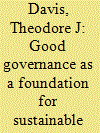

|
|
|
|
|
| Summary/Abstract |
Data indicate that good governance and human development continue to be major issues throughout sub-Saharan Africa. The findings show a significant relationship between the measures of good governance and human development. The findings suggest that policies and efforts aimed at improving government effectiveness and political stability would have the most significant impact on human development and poverty reduction efforts. The findings lend support to the adoption of integrated policy approaches that take into consideration political development along with economic development to reduce poverty in sub-Saharan Africa.
|
|
|
|
|
|
|
|
|
|
|
|
|
|
|
|
| 4 |
ID:
151513
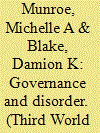

|
|
|
|
|
| Summary/Abstract |
Structural adjustment policies (SAPs) facilitate the hollowing out of the traditional roles performed by states. As a consequence, private entities (some perverse) offer services the state is incapable of or unwilling to provide. Beginning in the 1980s, SAPs plunged neighbourhoods in Latin America and the Caribbean into socioeconomic, and political disorder. This paper assesses the relationship between neoliberal reforms to the Jamaican state and the metamorphosis of violence since the mid-1980s. Neoliberalism transformed violence in Jamaica by increasing inter-gang conflicts, shootings and gang-related murders in Kingston’s garrisons. It also transformed political enforcers into community dons who use violence as a tool for business transactions in the international drug trade, and as a method of gaining local respect and authority.
|
|
|
|
|
|
|
|
|
|
|
|
|
|
|
|
| 5 |
ID:
151520


|
|
|
|
|
| Summary/Abstract |
How are global human rights localised in authoritarian societies? How and what human rights discourses are mobilised by indigenous peoples to further their demands? Building upon original fieldwork among Nubian activists in Egypt, this article explores the complexities regarding human rights framing through a discussion of recognition of Nubian indigeneity. The article finds that the history and political experience of Egypt’s Nubians bring about diverging opinions and also limitations as to how, and what, human rights frameworks rights claimants and their supporters are to employ. It argues that Egyptian nationalism not only affects how Nubian activists mobilise in general, but also helps explain the very limited appeals to a global discourse of human rights.
|
|
|
|
|
|
|
|
|
|
|
|
|
|
|
|
| 6 |
ID:
151510
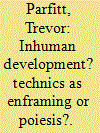

|
|
|
|
|
| Summary/Abstract |
This paper will examine some of the ways in which development has been influenced by the body of ideas known as techne, or technics. This body of ideas focuses on a central theme that envisages technology broadly defined as developing its own impetus that removes it from the control of human agency and that begins to circumscribe and even control human agency. This can be seen as having various impacts on development, notably a subsumption of any concern for human development to issues concerning process and production of outputs. The paper focuses on the approach of Heidegger as he provides an account that places technology at the centre of human being, whilst helping to distinguish both the negative (enframing) tendencies and the emancipatory (or, as Heidegger might have it, poietic) possibilities of technics. The paper concludes by identifying some of these negative and emancipatory influences in the development context.
|
|
|
|
|
|
|
|
|
|
|
|
|
|
|
|
| 7 |
ID:
151519


|
|
|
|
|
| Summary/Abstract |
The convergence of diverse global factors – food price volatility, the increased demand for biofuels and feeds, climate change and the financialisation of commodity markets – has resulted in renewed interest in land resources, leading to a rapid expansion in the scope and scale of (trans)national acquisition of arable land across many developing countries. Much of this land is on peripheral indigenous peoples’ territories and considered a common property resource. Those most threatened are poor rural people with customary tenure systems – including indigenous ethnic minority groups, pastoralists and peasants – who need land most. In Ethiopia large areas have been leased to foreign and domestic capital for large-scale production of food and agrofuels, mainly in lowland regions where the state has historically had limited control. Much of the land offered is classified by the state and other elites as ‘unused’ or ‘underutilised’, overlooking the spatially extensive use of land in shifting cultivation and pastoralism. This threatens the land rights and livelihoods of ethnic minority indigenous communities in these lowlands. This article argues that recent large-scale land acquisitions are part of state strategy for enforcing political authority over territory and people. It examines the implications of such strategy for indigenous ethnic minority groups, focusing particularly on the Benishangul-Gumuz region.
|
|
|
|
|
|
|
|
|
|
|
|
|
|
|
|
| 8 |
ID:
151517


|
|
|
|
|
| Summary/Abstract |
It is argued that China’s relationship with Africa has transformed into one defined by a dynamism and African agency, thereby lessening the hold the former previously had on Africa in the early days of this evolving alliance. First, the authors will conduct a literature review of historical Sino–African relations, from the early Han dynasty to its contemporary manifestations. The second section will continue with this analysis by focusing exclusively on the status quo of the Sino–African economic relationship, including analysis of trade flows, investments, development, economic cooperation, and Chinese support for regional integration. Finally, this paper will conclude with an elaboration of some key, emerging relationship areas, such as opportunities for China and Africa to collaborate on the achievement of the latter’s Agenda 2063 and African Mining Vision.
|
|
|
|
|
|
|
|
|
|
|
|
|
|
|
|
| 9 |
ID:
151514


|
|
|
|
|
| Summary/Abstract |
This paper analyses the existing and perceived rules and restrictions of the global development dispositif working to maintain inequalities in the interactions of international NGOs (INGOs) and Haitian organisations. It does so by exploring constructions of partnership and their clashing realities. Development organisations and agencies have influenced the fabric of Haitian society and politics not only by their mere presence but also by the rules they impose. The paper identifies positions of power and decision making by drawing on Foucauldian tools of discourse analysis. The analysis is based on empirical fieldwork carried out in Haiti between 2012 and 2014. It identifies a narrative of trickle-down pressures that INGOs draw upon to position themselves as intermediaries in the larger development system. By questioning these narratives, the paper provides the starting point for the development of alternatives that would enable international NGOs to assume a role that supports rather than weakens.
|
|
|
|
|
|
|
|
|
|
|
|
|
|
|
|
| 10 |
ID:
151512
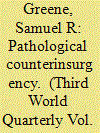

|
|
|
|
|
| Summary/Abstract |
Many voices in the US policy community have suggested that El Salvador provided a model for US counterinsurgency operations in Iraq and Afghanistan, based on the unsound contention that elections increased government legitimacy and effectiveness. The same flawed assessments were present in counterinsurgency strategy in Iraq and Afghanistan – unfounded assumptions that elections would increase legitimacy and improve institutional performance and human rights records lead to inaccurate analysis and bad strategy. Indeed, the US experience calls into question the ability of even a great power to impose legitimacy on a partner in order to wage counterinsurgency. Assuming that elections will advance such legitimacy is a dangerous pathology.
|
|
|
|
|
|
|
|
|
|
|
|
|
|
|
|
| 11 |
ID:
151511


|
|
|
|
|
| Summary/Abstract |
The concept of environmental peacebuilding is becoming increasingly prominent among peacebuilding scholars and practitioners. This study provides a brief overview about the various discussions contributing to our understanding of environmental peacebuilding and concludes that questions of space have hardly been explicitly considered in these debates. Drawing on discourse-analytic spatial theory, I discuss how the social construction of scale, place and boundaries are relevant for environmental peacebuilding processes and outcomes. This theoretical approach is then applied to the Good Water Neighbours project, which aims at improving the regional water situation and at building peace between Israelis, Palestinians and Jordanians. The results suggest that discursive constructions of space are important in facilitating, impeding or shaping environmental peacebuilding practices. Analyses of environmental peacebuilding, but also of peacebuilding more general, are therefore encouraged to draw more strongly on the findings of spatial theory.
|
|
|
|
|
|
|
|
|
|
|
|
|
|
|
|
| 12 |
ID:
151515


|
|
|
|
|
| Summary/Abstract |
This article examines how the Venezuelan government has discursively justified passing legislation that forbids NGOs that promote political rights from receiving foreign funding. Existing theories of globalisation theory fail to fully explain this phenomenon, including world polity/society and world-systems theories. Instead, I argue that although existing cultural scripts promote the spread of democracy and human rights through NGOs, the Venezuelan government has utilised a discourse of national sovereignty to justify its anti-NGO efforts. I argue that instead of one overarching set of cultural scripts, the world polity/society contains conflicting cultural scripts. In doing so, I develop the concept of the world cultural toolkit in order help us make sense of these contradictory cultural scripts concerning state policy.
|
|
|
|
|
|
|
|
|
|
|
|
|
|
|
|
| 13 |
ID:
151521
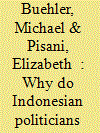

|
|
|
|
|
| Summary/Abstract |
Taking the discussion in the existing literature on the adoption of shari’a laws in democratising Muslim-majority countries as a starting point, we posit that there are two broad motivations for democratically-elected politicians to adopt shari’a laws and regulations: ideological conviction on the one hand and response to the expressed or perceived preference of constituents on the other hand. The ‘demand side’ can be further divided into the preferences of individual voters, and the interests of groups which act as power brokers, influencing the voting choices of individual citizens. These groups may be economic, religious, or other actors. These motivations are not mutually exclusive; the passage of a given shari’a regulation may fulfil two or all three of them simultaneously. However, we posit that the interaction between the place, timing, and content of shari’a laws passed in a nation as a whole will vary in various predictable ways, according to the dominant motivations. The dominant motivation may also affect the vigour with which the law is implemented.
|
|
|
|
|
|
|
|
|
|
|
|
|
|
|
|
|
|
|
|
|